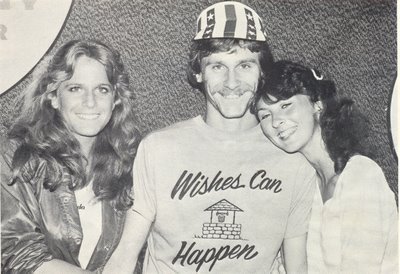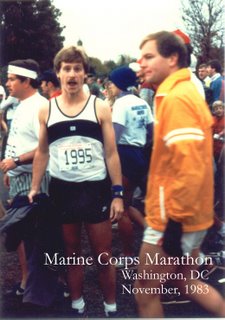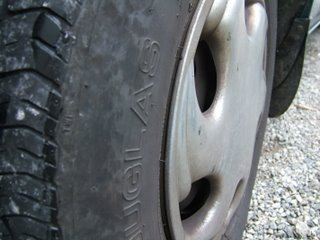 Melody had a good birthday yesterday, no thanks to me. I’ve had a cold for about four days. We both got up at the same time yesterday morning (a Saturday), and I was a real drip. Melody sat on the sofa, I sat on a chair, and we just kind of looked at each other. I wished her Happy Birthday, but it was pathetic. I rubbed her feet for her, but I kept having to stop to blow my nose.
Melody had a good birthday yesterday, no thanks to me. I’ve had a cold for about four days. We both got up at the same time yesterday morning (a Saturday), and I was a real drip. Melody sat on the sofa, I sat on a chair, and we just kind of looked at each other. I wished her Happy Birthday, but it was pathetic. I rubbed her feet for her, but I kept having to stop to blow my nose.“I’m sorry I’ve been such a pain in the ass these last four days,” I said.
Melody said, “That’s okay.”
That’s okay? It wasn’t the answer I was looking for. Melody should have known I was fishing for a denial. She was supposed to say, “You haven’t been a pain in the ass.” It’s like somebody saying, “I’m stupid,” and another person answering, “That’s okay.” It’s not the answer you want to hear.
I gave Melody her birthday card. In it, I explained to her that I couldn’t afford to buy her a present. Instead, I was taking her out to eat. I was humiliated at not having enough money for a present and dinner.
“That’s okay,” Melody said.
A guy downtown stopped me two days ago and asked me for fifty cents. I had no paper in my wallet, but a lot of pocket change. This isn’t the first time the guy has asked me. Sometimes I tell the guy, “Nope, I don’t have it today.” I usually say this, for some reason, when I’m loaded. I’ve given him enough change in the past year that I could tap him once in a while. But today, all the money I had in life was in my pocket, so I reached in, pulled out a handful of change and presented it to him. There was one quarter, a few dimes, and hordes of nickels. I looked at the guy as if to say, “pick it out.” But he looked at me as if to say, “I can’t add.” So I just dumped the whole pile of silver into his upturned palms. He looked like he had hit the jackpot at Caesar’s Palace. I walked away content, realizing I’d given the widow’s mite.
“What would make this eon more difficult?” God asks.
“Freezing cold weather,” I say.
“I believe I can arrange that. What else?”
“A cold. You know, a virus that attacks the body and makes it produce histamine. In practical terms, I’m talking about a nose that constantly drips and agitates a person, and everyone around that person.”
God looks thoughtful. “Oh, I get it,” He says. “Life is hard enough without being constantly cold and having to incessantly blow one’s snot out, but this would make living damn near impossible.”
“You’ve got it.”
And so it was done.
It is an experience of evil Elohim has given to the sons of humanity, to humble them by it —Ecclesiastes 1:13.
“My sister and sisters-in-law want me to go shopping with them on my birthday,” Melody said. “I think it will be fun.”
“Then go ahead, please,” I said. “I’m going to take a nap.”
“But you just got up.”
“Have I wished you Happy Birthday yet?”
“Yes.”
“I meant it, too. Good night, now.”
I thought I heard the door slam as Melody left for the mall.
When I awoke from my nap, there was a note on the counter. It was from Melody. In the note, Melody said that she would like the floors swept and washed, the upstairs bathroom cleaned, and the carpets vacuumed.
Here’s something I can do to maker Melody happy, I thought. So I ordered my three sons to get started, and drove to my office to drink a cup of coffee and eat salted peanuts. I had to get away and relax. My cold was stressing me out. I felt a little better after my nap, but the house was getting to me. But as I sat there in the beautiful silence of my office cracking my peanut shells and drinking coffee, I realized that I had better get home and help the boys. I had to redeem myself on Melody’s birthday.
I made it my task to clean the upstairs bathroom. I had no gift to bring, so I became The Little Drummer Boy, only with a toilet brush instead of drumsticks.
I scrubbed the toilet for her, pa ruh-pa-pa pum;
I scrubbed my best for her (a lie), pa ruh-pa-pa pum, ruh-pa-pa pum, ruh-pa-pa pum.
Melody came home with a sack full of clothes that her sister and sisters-in-law had bought for her. Thank God for those women. Melody was in a great mood because of the clothes. The boys and I had cleaned the house, and it looked great. Melody noticed, and praised our efforts. But wow, what a bunch of clothes. Melody pulled out each piece one at a time, and held them to herself while we men praised her. It was four p.m., and the day was finally shaping up. Better late than never.
Our son Aaron said, “I have a taste for El Campesinos.” This meant that he had a taste for Mexican food, as well as for going out to dinner with Melody and me. Our youngest son Jefferson said the same thing. (Our oldest, Artie, had gone to work.) I had snuffed any spark of romance with my incessant snuffling, so I was all for a family outing. Let’s go together, I said. Melody beamed.
Melody had a happy birthday. I’m so glad she was born. Without her and me together, our children would not be here. We looked at each other at the restaurant and appreciated being together. We visited Artie at his job. We drove home safely, and so did Artie, later.
Melody had a happy birthday.
We have all been born, thank God.
© 2006 by Martin Zender











